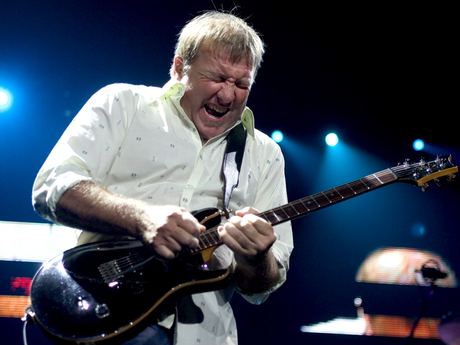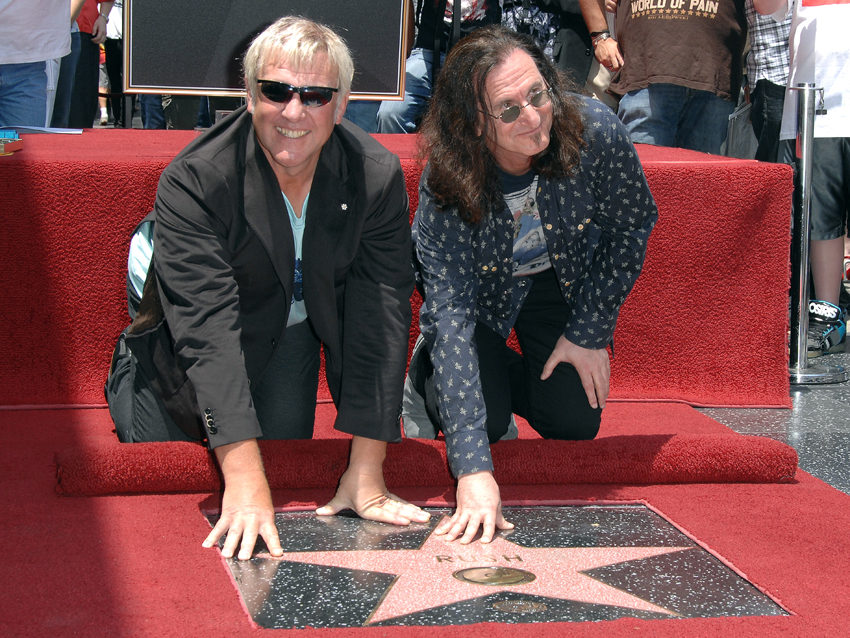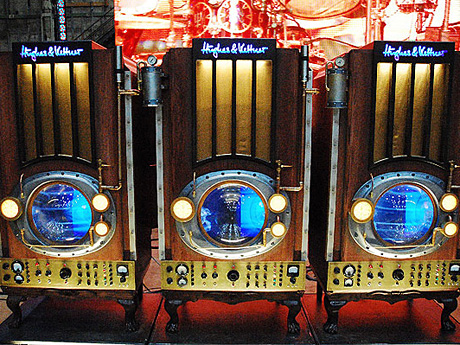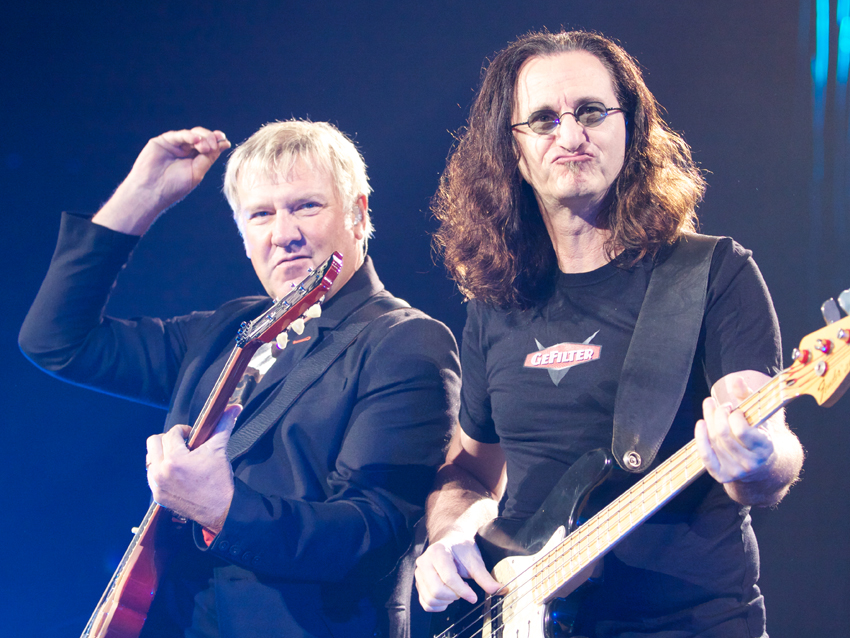
Alex Lifeson on stage with Rush in 2004, playing one of his Paul Reed Smith CE models. © Ethan Miller/Reuters/Corbis
Rush's Alex Lifeson is a man who knows how to party. It's his 57th birthday, reason enough to bag work and head out on the sailboat with a cooler full of brews. But the affable yet soft-spoken guitar hero has other, better plans, like hitting the stage at the State Fair Grandstand in St Paul, Minnesota before 17,000 fans and giving them a three-hour present they'll always remember.
"To be honest, there's nothing I'd rather be doing," Lifeson says. "What's going on with the band right now is so fantastic, and the acceptance we're getting from the audiences - I've been saying this for a few years now so I should probably stop, but it really feels like the best time to be in Rush. The three of us are enjoying every second of it."
And with good reason: even without the benefit of a new album (although they recently released two songs, the rifftastic Caravan and BU2B), Rush are experiencing the kind of banner year that most bands, veterans or newbies, can only dream about. There's the sold-out Time Machine tour (sure, doing their beloved 1981 album Moving Pictures in its entirety hasn't hurt ticket sales, but packing 'em in hasn't been a guarantee for any act during this tough economic year). There's the universally well-received documentary Beyond The Lighted Stage, which details the history of the group but also exposes a rich and humanistic (and, at times, wildly funny) side to their story rarely seen in rock docs.
And then there's the award that trumps most, a star on the Hollywood Walk Of Fame. No, we're not talking Guitar Center's Rock Walk, we're talking the real deal, a six-foot section on that storied stretch that immortalizes other well-known rockers such as Bogart, Chaplin and Monroe. "What a huge thrill," Lifeson says, letting out a chuckle, as if he still can't quite believe it himself. "For three guys from Canada who just wanted to play music, to get that kind of recognition...well, we're still stunned."
It all seems part of Rush's remarkable, unbroken streak of doing the impossible: playing 20-minute pieces of progressive rock during the height of punk and New Wave (although they did sneak a bit of Police-inspired reggae into their breakthrough hit The Spirit Of Radio); dispatching guitar and drum solos during concerts when such flagrant displays of instrumental dominance were seen as decided no-nos by an overwhelming portion of the music press illuminati. Hell, they even let the drummer write the lyrics! Didn't somebody read these guys the rules?
And yet, it all worked like a charm. Further proof of Rush's ability to buck every trend in existence lies is this fascinating phenomenon: as they gain new fans, many of whom never even heard of 2112 let alone own it, the group retains a vice-like hold on its longtime devotees. In this way, Rush are progressive rock's answer to the Grateful Dead. All are welcome to the dance.
Get the MusicRadar Newsletter
Want all the hottest music and gear news, reviews, deals, features and more, direct to your inbox? Sign up here.
And so here we are with the birthday boy himself, Mr Lifeson. Before stepping out onto the lighted stage, the celebrated guitarist chatted with MusicRadar, holding forth on topics such as Rush's upcoming album, Clockwork Angels; the decision to play Moving Pictures in its entirety; steampunk stage design; and what just might be his new favorite solo to play live.
Happy 29th birthday, man! Seriously, you don't even look it.
[laughs] "That's great! Oh my, I'm so far past 29 that I don't even joke about it anymore. But thank you. That's very nice."
You're a little more than midway through the tour. How are things feeling?
"Things are good. I'm a little tired today. You get that way at the halfway point in a tour, and then you kind of zip back to feeling energized again. It's like anything, really."
So let's talk about the place that Rush holds in modern culture these days. You guys were never seen as the 'cool band,' but now you are; in fact, you're way cool.
"I know. It's incredible, isn't it?"
A lot of things have led to this sudden shift in the earth's axis, but surely the new documentary had a big impact. People never realized how funny Rush could be.
"I guess that's true. I think Rush have always had this reputation, particularly to non-fans, of being an ultra-serious and cerebral group when, in fact, the reverse is true. We don't take ourselves seriously at all. Sure, we take our music seriously, but that's altogether different. As people, we're just three regular guys. People are always stunned at how normal and we are. We don't act like rock stars. We have very middle-class values and a good work ethic. Behaving like rock stars, that's just not the way we're built.
"I think the documentary, above anything else, made us accessible to women. Believe me, it hasn't gone unnoticed that we're seeing a lot more women at our shows than ever before, and that's probably not by accident. Something is definitely bringing women in. I think the documentary affected them somehow."
I'll be honest, Alex: My wife was never a huge Rush fan, but she watched the documentary with me and said, "Oh my God, I love these guys! They're so fun." Her mind was completely turned around.
"That's amazing, isn't it? We've heard that's been the case, and again, it's reflected at our shows. Perhaps a lot of women - maybe their husbands or boyfriends were lifelong fans - might never have thought of coming to see us live, but they saw the documentary and see us in a new light.
"It's probably a lot of other things, as well. Getting the star on the Hollywood Walk Of Fame was a great moment for us, an unbelievable honor, obviously. Plus, we did that film, I Love You Man, which also exposed us to a new audience. In addition, and this might be the biggest thing of all, there's the fact that we've just been around for so long. Eventually, you kind of wear down people's resistance, and they start to see you for what you really are. I do think the documentary helped in that area - it showed everybody how close a unit we are and that we really love and care about one another. Our bond goes way beyond the music."
The press, too, is on your side now. This wasn't always the case. I assume you've noticed a difference in how journalists treat the band.
"Yeah, for sure. We've had our share of poor press, particularly in the early days. But over the years, that's improved. You know, we just do what we do, and we don't think too much about what the press has so say about us. I can see now that the press is overwhelming positive, which is nice. At the same time, I think we're playing really well, perhaps the best we've ever played. There's a confidence in our groove. The bottom line is, we're having a lot of fun. Every night we hit that stage and have a fantastic time. The audience sees it and feels it , and after a while, I think the press picks up on it, too."
Do you think your situation with the press is analogous to what Led Zeppelin experienced? In their early days, they got bashed by magazines like Rolling Stone, but over time younger writers came up and weren't afraid to say, "Hey, wait a minute. I always loved that band!"
"We are seeing more of that. You know, when we started out, our audience was all teenagers, and of course, we weren't much older. But now we've got doctors and lawyers and heads of film studios and people who are involved with big corporations, and they've been Rush fans for years. It's really kind of weird. [laughs] Again, I think it's just a matter that we've stuck around for so long."

Alex and Geddy Lee get the red carpet Hollywood treatment last June. Neil Peart was riding his motorcycle to a gig at the time. © RD / Scott Kirkland /Retna Ltd./Corbis
"As far as the press goes, you're right. Those fans from years ago did become journalists, and maybe they are writing more positive pieces about us. It's changed dramatically. At the same time, the mainstream press…what does it really mean anymore? Communication and the ways we get our information, it's so different now. Things are online, then they go viral - everything's all over the place."
I find it a little surprising that Rush would go on tour while in the middle of recording a new album.
"Well, we're not really in the middle. We wrote six songs and recorded two of them, both of which we're playing live. We'd like to start writing again once the tour is over. I'm guessing that we'll resume recording at the start of the new year.
"Our decision to go on tour during an album project…I don't know, we just thought it'd be kind of cool. Plus, there's nothing that gets your playing chops together like being on tour. We wanted a break in the routine, and I think we didn't want to just sit in a studio and feel burdened with coming up with an hour's worth of music at one time. So we kind of said, 'Let's record these two new songs, put them out there and hit the road.'"
You guys are going to be playing South America in October. This will be your first time there since 2002, and only the second time you played that part of the world.
"That's right. We're really looking forward to it. We have two shows in Brazil, a show in Buenos Aires and a show in Santiago. The Rush fans are pretty crazy everywhere, but they're particularly wild in South America. Those dates should be a lot of fun."
A major highlight of this tour is that you're playing Moving Pictures in its entirety. What led to this decision?
"Actually, the idea came from Neil. He had seen Steely Dan play last year, and they were doing a different album every night. So that got him thinking that maybe we should do something like that.
"We always needed to address the song Camera Eye because it's the most-requested track in our catalogue. So the decision to do Moving Pictures from beginning to end meant that we could do Camera Eye but also do something interesting that we knew our fans would enjoy. It's been absolutely terrific, I must say. We start playing Moving Pictures, and by the time we're done, it feels like time just flew by. The fans love it, we love it - I'm really glad at how it's being received.
"I have to tell you, though, no matter what the songs, I love playing every night. There's never a night where I'm not loving what I do - and what we do. And every night I try to play better than I did the night before. I'm never satisfied. I think I'd be scared if I was satisfied, because that would lead to complacency. I'm always trying to play a perfect show, and when you consider that we perform for three hours, that's a very elusive thing."
A few years ago, you've mentioned to me that the solo to Limelight is one of your favorites to play live. Do you still feel the same way?
"I've always enjoyed the elasticity of that solo, particularly the way it sounds on the record. It has a certain tonality I just love. I do like playing the solo live, but I think I prefer listening to it on the album. On record, it has a magical quality to it - it really conveys the pathos of the song and the lyrics. I've never been able to re-create that live. I get pretty close, but it's never exactly the way it is on record. I'll keep trying, though."

Alex Lifeson's steampunk-inspired Hughes & Kettner cabinets, specially designed for the Time Machine tour.
"These days, however, I'd have to say that the solo in La Villa Strangiato is starting to catch up to Limelight as my favorite to play live, and for the same reasons: It's quite emotive, and it's got a very bluesy, almost minor-ish feel to it. Also, the music that surrounds the solo - everything Geddy and Neil are doing - is incredible. It feels great to play it on my 355, which is the guitar I recorded it with. All in all, it's a wonderful moment."
Talk to me about the steampunk stage design of the Time Machine tour. Your Hughes & Kettner cabinets, Neil's drums, Geddy's setup - it's totally wild. What brought this about?
"We were just talking about what kind of theme we could go with as far as the staging for the tour, and we dug the idea for the steampunk imagery. We all worked independently on getting our stuff together, although Geddy and I both used the same guys to do the actual manufacturing. Neil used somebody else for his drums. They did a great job, and I think the audience is really thrilled with the way it looks.
"The whole steampunk movement is very interesting. We've been aware of it for a while now, and there's certainly a lot of great stuff out there that people are doing. It's worked out well for us; it's a neat surprise for everybody. I'm very happy we went with it."
Let's get into your two new songs, Caravan and BU2B, both of which have fantastic solos -
"Oh, thank you!" [laughs]
Well, that's what I wanted to talk to you about. I love how unruly the solos are. Was that what you were going for?
"Yeah, absolutely. With Caravan, I definitely wanted something that was out of control. It's all over the map, kind of frenetic and climbing up and down with what the rest of the track was doing.
"In the case of Brought Up To Believe, at first we experimented with something more traditional, but it just sounded, I don't know…ordinary. So we decided to punctuate points in the solo section with a more screaming guitar presence. I think it worked."
I would agree. By the way, is Brought Up To Believe the correct title?
"It goes by both names. You can call it either one, really."
What guitars did you use on those songs?
"On those I was using my '59 Les Paul reissue, my 355 and my Telecaster [a 1959 reissue]. For the solos, used the Les Paul."
Caravan and Brought Up To Believe are pretty rocking. Are they a pretty good indicator of what we can expect from Clockwork Angels?
"I don't know. I'm curious to see how it all develops. When we finish the tour, we'll review the songs we wrote. There's bound to be some changes and modifications. In fact, I think both Caravan and BU2B will be re-recorded."
Really? Why is that?
"Because they've grown. And, you know, why not? We'll see what happens and see if we can better them - although we are happy with them as they are now.
"The title track, Clockwork Angels, is becoming quite an epic, so we'll have to see where that goes. It's going to be a lot of fun getting back in the studio, especially at this point in the game, when we're playing at our peak."
Every group, I would imagine, feels they have something to prove with each new album. What are your goals on Clockwork Angels - personally, as a guitarist, and collectively, as a band?
"Hmmm. I don't really think in those terms. We don't feel as though we have to prove anything. We just want to write great songs. As you know, the album format seems to be dying in some ways. Rush are traditionalists, so I don't think it'll die for us. This is the first time that we released any new material independent of an album, which was a good thing for us. We wanted to do something different and step out of the box a little bit. It's something we might do again: spend a month or so writing, record two or three songs and release them. Why not?"
It's what bands did back in the '60s. The Beatles, The Rolling Stones - they were always putting out singles that weren't on their albums.
"Yep, I remember that. Sure. I think it's good for us to do stuff like that. But going back to the original question, we're not out to prove anything on this record. We're quite happy with the material we have; we'll get in and finish the record; and once we put it out, probably sometime next year, we'll hit the road with a tour that highlights the album."
You've been recording with Nick Raskulinecz in Nashville. Are you going to go back there to finish the album?
"I don't know. For those two songs, we did work in Nashville, but we haven't made any decisions as to where we'll record when we pick things up again. You know, I have my own studio at home, so I'd love to do the guitars there. The thing about Nashville is, that's where Nick lives. He'd been away from home a lot, and I think he was really hoping that we'd agree to work there. We didn't have a problem with that. It's good for us to go away sometimes and be a little more focused - certainly, there are distractions when you're home. So going to Nashville and working for a week was no big deal. Blackbird is a terrific studio. Great gear, great rooms, a wonderful staff - it was a no-brainer to be there.
"Moving forward, however, we'll see. You know, Neil lives in Los Angeles, so I'm sure he wouldn't mind if we did the drums there. I want to do the guitars in my home studio. I don't know how Geddy feels about going to separate studios to do vocals and bass tracks. It's all a ways off, though. We still have a bunch of touring to do."

Alex and Geddy do their best 'Guitar Hero' poses at the Air Canada Centre in Toronto, Canada last July. © Brian Patterson/Corbis
You mentioned some of the guitars you've been recording with, but what models are you using live?
"Let's see, I've got a bunch of Les Pauls, some with different tunings. I've got the 355 and the Telecaster. I've got two Paul Reed Smiths CE models - one has active, single-coil pickups, and the other is the straight CE bolt-on that I've had for 20 years or so. I think that's it."
Regarding the Les Pauls, have you made any new modifications to them?
"I haven't done anything since I got those guitars, but I've been working with Gibson on putting together a Les Paul Axcess model, which would be an Alex Lifeson signature guitar. It'll have the Floyd Rose, the piezo pickup in the bridge and single-coil taps in the volume pots. Basically, we've taken everything you could want in a guitar and we're putting it into a really true utility instrument in a fantastic platform."
You're not busting out the Gibson EDS-1275 double neck anymore, though, huh?
[laughs] "No. I think I'm a little too old for that. It hurts my back too much. Maybe next tour I'll bring it out. We'll see."
Do you have any kind of practice routine? Is there anything in particular that you work on?
"Not really. I'll just play stuff. I'll mess around with tunings and what not. If I want to work on strengthening my fingers, I might do certain little exercises - fast little funs and pulls. But generally, when I'm just playing for my own enjoyment, I'll just play. I don't play songs per se; I just…you know, I play! [laughs] There's no routine. On show days, however, I will practice for 20 or 25 minutes about 45 minutes before the show. I'll run through some leads and scales, just things to limber up my fingers."
Rush is coming out with a version of Guitar Hero video game based on the album 2112. How involved were you with Activision in the overall concept?
"They included us in the early talks about how they wanted to present the game. They wanted to take it a step further from what Guitar Hero originally was and make it more of a story-oriented game. We did some narrative stuff for it. I have to say, they were very considerate and really cool to work with."
I remember when Rush played Tom Sawyer on Rock Band backstage at The Colbert Report. You guys weren't too good at playing your own song on a game system. Are you any better at Guitar Hero?
[laughs] "No, I retired after that. I'm much better at the real thing."
Liked this? Now read Rush's Alex Lifeson: "My 3 best solos"
Joe is a freelance journalist who has, over the past few decades, interviewed hundreds of guitarists for Guitar World, Guitar Player, MusicRadar and Classic Rock. He is also a former editor of Guitar World, contributing writer for Guitar Aficionado and VP of A&R for Island Records. He’s an enthusiastic guitarist, but he’s nowhere near the likes of the people he interviews. Surprisingly, his skills are more suited to the drums. If you need a drummer for your Beatles tribute band, look him up.
